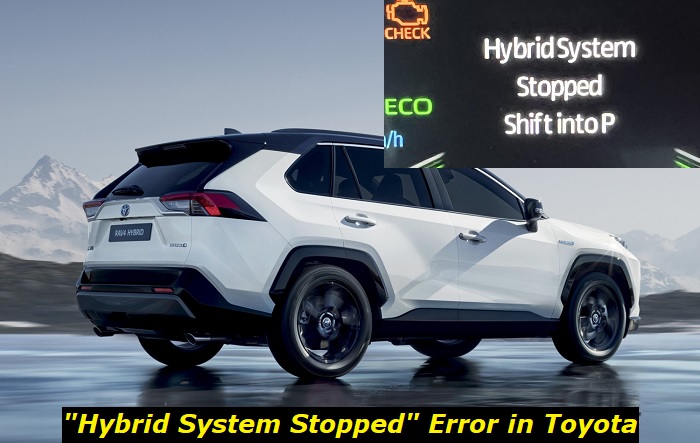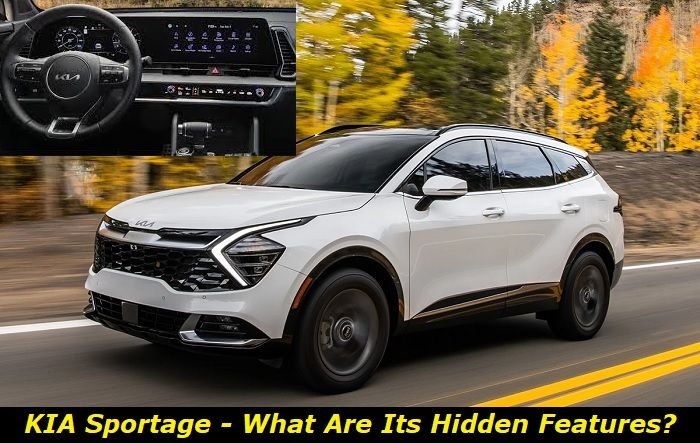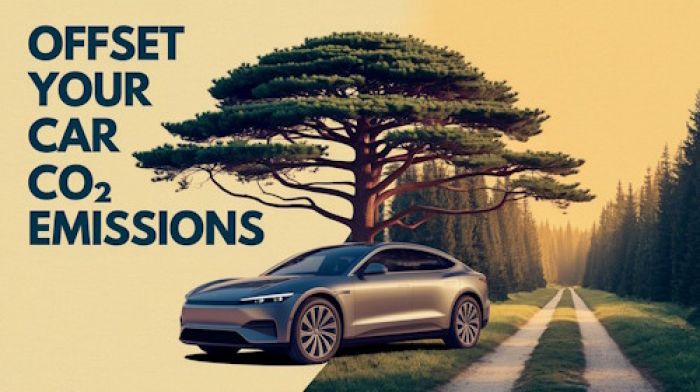Toyota is known as one of the most reliable car brands on the market because they take extra care in making their cars last as long as possible. Even though this does mean that Toyota cars tend to experience issues not as frequently as some other brands, it does not mean that they are immune to issues entirely.
Hybrid system stopped, shift to P message highlights
- Common reasons:12V battery issues, cold weather software problem
- How to fix:charge or replace the 12V battery, take the vehicle in
- Possible consequences:car won't drive
- Priority level:High
- Can you drive?No
- DIY repair:Impossible
- Repair price range:$250-$600

Hybrid System Stopped, Shift into "P" in Toyota. What's This?
The message "Hybrid System Stopped, Shift into 'P'" in a Toyota hybrid vehicle is an alert indicating that something is likely wrong with the hybrid system. If you encounter this message, it's best to immediately shift the car into the "Park" (P) position, turn the car off and take out the key. Problems such as these can often lead to a malfunctioning hybrid battery, electrical faults, or even minor sensor problems.
Be that as it may, due to the complex nature of hybrid systems, it's best to consult a qualified technician for diagnosis. Ignoring issues such as these is not a good idea if you aren't aware of what exactly causing the problem.
Hybrid System Stopped, Shift into "P" in Toyota - Possible Causes
- Battery Issues
- Sensor Problems
- Electrical Problems
- Cooling System Issues
- Software Glitches
1) Battery Issues
The hybrid battery is one of the most complex and expensive parts of a hybrid vehicle as it serves as a power bank for the electric motors. If you encounter a message like "Hybrid System Stopped, Shift into 'P'," one possible reason is a problem with the battery itself.
As disappointing as that is, batteries have a finite lifespan and are likely to start causing problems once they get older. A malfunctioning battery may struggle to hold a charge, may discharge too quickly, or might even not provide sufficient power to the electric motor, thereby compromising the entire hybrid system and causing a problem such as this one.
2) Sensor Problems
All cars these days are equipped with a bunch of sensors that act as the eyes and ears of the entire car. Once a sensor notices something strange, it is likely going to communicate that to the ECU which will then prompt the associated warning light on the dashboard.
If a sensor fails or malfunctions, it can cause the ECU to panic thinking that something is wrong with the component the sensor monitors, even if the component itself is not causing any problems at all. As a safety measure, most cars will ask you to shut them off just to be safe.
3) Electrical Problems
As mentioned previously, hybrid cars are immensely complex. Some even say that hybrid cars have more than 3 miles of combined wiring within them. If you pair that with all the sensors, connectors, ECUs, and other parts, it can get pretty crowded in there.
With such complexity comes an increased chance that something within that system could cause problems. For example, if the inverter starts malfunctioning, it is going to affect the car's ability to control the electrical flow between the battery and the motors. This, in turn, could cause the warning light to come on.
4) Cooling System Issues
Most electric cars these days aren't designed as performance cars, and the ones that are can often suffer from high temperatures. For example, a Tesla Model S Plaid is a through-and-through performance EV with more than 1000hp, but if you push it too hard, it is going to limit power due to high temperatures.
This means that more normal EVs have an even lower stress ceiling when it comes to temperature. So, if any of the car's essential components start overheating, the car is likely to prompt you to turn it off and leave it until it cools down.
5) Software Glitches
One of the simpler causes of this problem is one where the software suddenly glitches or buggs out and thus the car starts panicking and shows the warning message. Issues such as these don't happen often, so if you experience this problem once or twice in a long while, it could be due to a software glitch.
Hybrid System Stopped, Shift into "P" in Toyota - Possible Solutions
1) Battery Problems Solutions
The first and main thing you need to do is take your car to an experienced mechanic for an in-depth diagnosis. Messing with a complex hybrid car isn't recommended even for those who have vast experience in repairing combustion cars as hybrids require lots of high-tech tools for this purpose.
Checking the battery is essential. If the battery is indeed the culprit, a good idea would first be to try and recondition it. If the car is still under warranty, it's always best to push for a complete battery replacement under warranty. If you are sadly out of warranty and battery reconditioning does not help, you will have to replace the battery out of your own pocket.
2) Sensor Problems Fixes
Approaching a sensor problem is pretty much the same as approaching a battery-related problem as both require a professional diagnosis to see what is actually the problem. Once you diagnose the car and find the faulty sensor, you will have to replace it.
This is usually the most straightforward solution as sensors aren't necessarily all that expensive but are very important to how the car operates.
3) Fixes for Electrical Problems
If these problems are related to wiring issues or electrical inverter issues, this definitely requires professional assistance as soon as possible. Both of these problems will typically be solved when any of the electrical components get replaced.
It's not a good idea to try and find problems yourself as a damaged/worn/scratched/scuffed high-voltage hybrid wire can be life-threatening. So, be sure to take your car to a professional.
4) Ways to Deal with Cooling System
If you've been thrashing your car with swift accelerations and top-speed runs, then you should just let your car cool down and the message is likely to disappear. On the other hand, if the problem occurs during normal use, you should check the car's cooling system as any issues such as broken fans, leaks, or blockages can cause serious long-term damage.
Solutions to this problem range from fixing leaks, and replacing components, to refiling your coolant and keeping a vigilant eye on it going forward.
5) Software Glitches Solutions
The simplest way to fix this issue is to perform a software reset or update your car's software. Most dealerships do this on the regular which means that doing this isn't supposed to cost much or last long. So, if there are no other standing issues that could be the cause, it's a good way to approach doing a software reset.
Is it Safe to Drive a Toyota With a Hybrid System Stopped Working Problem?
The answer to this question depends highly on what is causing the problem to begin with. If it's a sensor problem, a software glitch, or a minor electrical problem, you should be able to drive the car without worrying too much.
However, if it's a serious battery or hybrid system issue, chances are that you won't even be able to drive the car. The best answer to this question is that you shouldn't drive the car until you are positively sure that the problem isn't related to something that could cause additional damage to your car or anyone else.
Are Toyota Hybrids Worth It?
There are some aspects where Toyota hybrid vehicles shine and are indeed worth it while there are also some aspects where they are not.
In a more general sense, if you want an eco-friendly car with good resale value, low maintenance, a smooth ride, and lots of tech, then a Toyota hybrid is indeed worth it. These cars are predominantly very reliable and are designed to last a long time if cared for.
They are also perfect for city driving as the combination of gasoline and electric power works best when used in urban areas. On the other hand, a Toyota hybrid often costs a lot of money, has a limited towing capacity, is complex, and is not too luxurious for its price tag.
Also, hybrid cars are simply not as good for highway cruising as that does not enable you to benefit from features such as regenerative braking or electric power. In this case, even a diesel car is more economical. It basically all boils down to the question of if you are going to use your hybrid Toyota for what is designed to do. If not, then the car is not worth it.
Conclusion
There are a few different reasons why a Toyota could experience this problem, most of which we've mentioned in this article. It's also worth saying that these aren't the only causes of this problem and sure aren't the only solutions to them.
Hybrid cars are immensely complex and there really is no better way to fix a problem than to take the car to an experienced mechanic with all the right skills and tools. A hybrid car is not a garage project for most people, at least not yet. Maybe someday it will be.
About the authors
The CarAraC research team is composed of seasoned auto mechanics and automotive industry professionals, including individuals with advanced degrees and certifications in their field. Our team members boast prestigious credentials, reflecting their extensive knowledge and skills. These qualifications include: IMI: Institute of the Motor Industry, ASE-Certified Master Automobile Technicians; Coventry University, Graduate of MA in Automotive Journalism; Politecnico di Torino, Italy, MS Automotive Engineering; Ss. Cyril and Methodius University in Skopje, Mechanical University in Skopje; TOC Automotive College; DHA Suffa University, Department of Mechanical Engineering





Add comment